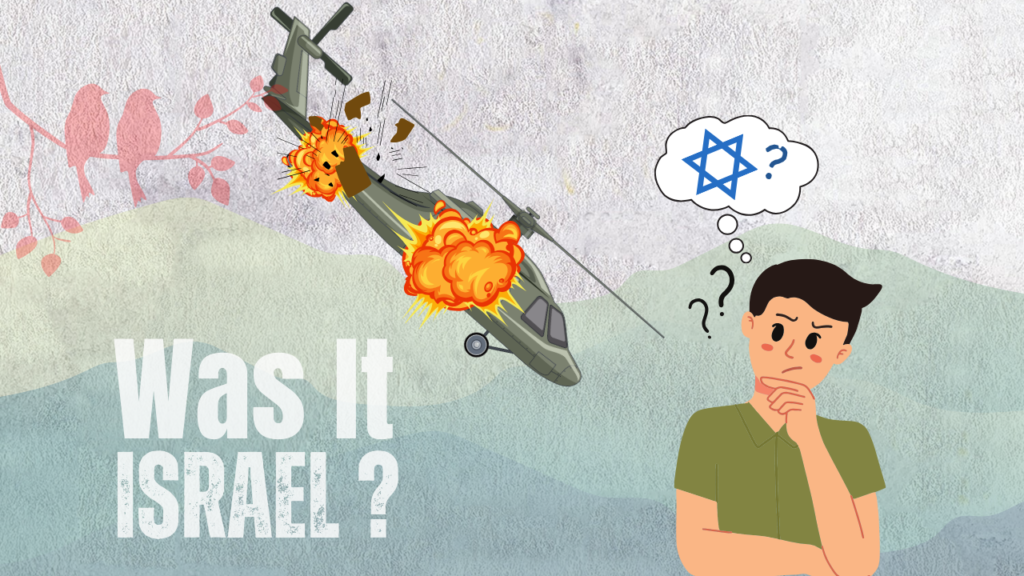Iranian President Ebrahim Raisi has tragically perished in a helicopter crash in East Azerbaijan province, according to reports from Iranian media. The incident occurred on Sunday, with the helicopter carrying President Raisi and Foreign Minister Hossein Amir-Abdollahian disappearing over a mountainous region.
Iran’s state television reported that there was “no sign” of life among the passengers of the helicopter. “Upon finding the helicopter, there was no sign of the helicopter passengers being alive as of yet,” the state TV said.
This incident comes amid a period of heightened regional tensions, particularly in the wake of the Gaza conflict and Iran’s recent confrontations with Israel. President Raisi, who assumed office in 2021, had consistently voiced Iran’s unwavering support for Palestine, a sentiment reiterated during his recent dam inauguration speech.
Iranian state media had shared videos of President Raisi aboard the chopper on Sunday, showing him gazing out of an aircraft window while several senior officials, including Foreign Minister Hossein Amir-Abdollahian, were seated opposite him.
A helicopter carrying Iran’s President Ebrahim Raisi and others crashed in Jolfa, a mountainous northwestern region, on Sunday. The tragic incident occurred as they were returning from a visit to Iran’s border with Azerbaijan.
In response, Iran’s Supreme Leader Ayatollah Ali Khamenei has appointed First Vice President Mohammad Mokhber as the acting president until elections are held. The elections are set to take place within 50 days. Additionally, Khamenei has announced five days of public mourning for the loss.
Here are the latest updates on this significant event:
- Video footage released by the state-run IRNA early Monday revealed the suspected crash site of President Ebrahim Raisi’s helicopter, situated in a steep valley within a lush mountainous region. Soldiers, conversing in the local dialect, can be heard saying, “There it is, we found it.” Shortly afterward, state TV confirmed, “There is no sign of life from people on board.”
- Pir-Hossein Kolivand, head of the Iranian Red Crescent, disclosed that the bodies of those lost in the helicopter crash have been transported to Tabriz. He also confirmed the cessation of search and rescue operations.
- According to CNN, citing Iranian media, a total of nine individuals were aboard the helicopter, including Raisi, Abdollahian, three Iranian officials, an imam, and members of the flight and security teams. Among the officials was Malek Rahmati, the Governor of Eastern Azerbaijan province.
- Despite challenging weather conditions characterized by dense fog and extreme cold, search efforts persisted overnight and into daylight hours on Monday in East Azerbaijan province, aimed at locating the crash site.
- Mohammad Mokhber, Iran’s First Vice President, chaired an emergency cabinet meeting on Monday, as reported by Tasnim news agency. A photograph from the meeting depicted a portrait of Raisi beside an empty chair adorned with a black robe.
- Palestinian militant organization Hamas expressed sorrow over the passing of Iranian President Ebrahim Raisi, highlighting his support during the ongoing conflict with Israel. Similarly, Lebanon’s Tehran-backed Hezbollah group also mourned Raisi, recognizing him as a “champion of resistance movements.”

What makes it a concern for the Middle East?
Israel has historically regarded Iran as its primary concern due to Tehran’s contentious nuclear program, possession of ballistic missiles, and backing of armed factions dedicated to Israel’s annihilation. Raisi, a hard-liner viewed as a possible successor of Khamenei, chastised Israel last month, saying “The Zionist Israeli regime has been committing oppression against the people of Palestine for 75 years.” Iran has also been accused by the Israel authorities for assisting the terror-designated organization Hamas for carrying out the brutal attack in Israel on October 7 last year.
Throughout the conflict, Iranian leadership has consistently shown support for the Palestinian cause, while their regional allies have taken even more decisive actions.
Lebanon’s Hezbollah, recognized as Iran’s most sophisticated military proxy, has engaged in a prolonged, low-intensity conflict with Israel since the onset of the Gaza war. This has resulted in frequent exchanges of attacks along the Israel-Lebanon border, compelling tens of thousands of individuals from both sides to seek refuge elsewhere. Israel is also believed to have carried out several attacks on Iranian official and Nuclear scientist in the past. If there lies any possible link between this killing and role of Israel, it will definitely lead to severe conflict in the entire Middle East region.


